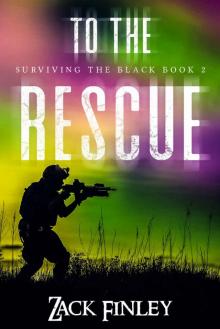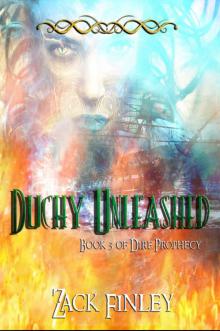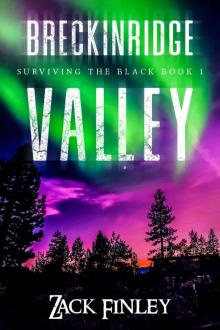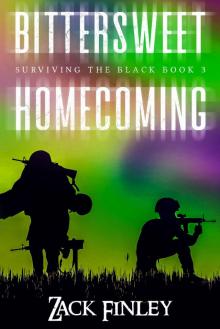- Home
- Zack Finley
To the Rescue; Surviving the Black--Book 2 of a Post-Apocalyptical Series Page 13
To the Rescue; Surviving the Black--Book 2 of a Post-Apocalyptical Series Read online
Page 13
Justice was still deficient in hot water, and it only had three wood stoves for cooking. Metalworkers in the Valley built them five wood stoves made from 55-gallon drums. While those stoves heated water rapidly, their shape and air control made them unsuitable for much actual cooking. They put out a lot of heat, which made everyone a lot happier. Until their arrival, Justice was a cold place to live.
After weeks of crapping in buckets and dealing with waste disposal, the new toilets at Justice went into service. Most of the comments that got back to me were of the “not as bad as I thought it would be” variety. Most of the guys had switched to using Zeke’s saltpeter urinals in both the Valley and Justice.
The Justice grey water was now draining into a ditch beside the road. We’d have to deal with it in the spring.
FOB Justice was now building chicken coops, rabbit hutches, and goat pens. Uncle George expected to send starter sets of animals once they were ready.
My mom allocated one of the current batch of hogs to Justice, as long as they provided the manpower to kill and process it. Due to trust issues, Steve was asked to limit the Justice residents’ Valley access to just the pig kill area. They would then take the carcass, blood, and other bits back to Justice to finish processing the animal.
The Justice contingent would come in a school bus and transport the carcass back in one of the county pickups.
Even if one of the newcomers betrayed us, I doubted anything learned from a pig butchering visit would harm the Valley. During the past weeks, everyone in Force Beta and Gamma worked closely with those now residing in FOB Justice. None of the new arrivals raised any concerns amongst my people. Besides, it wouldn’t hurt the new people to realize Valley defenses were solid.
I was in the armory taking a break before supper and helping Zeke reload magazines for training and emergency use. We both enjoyed working here together. No topic was off limits. Any member of Beta or Gamma was welcome to spend time in the armory when not assigned to other duties. This was where we usually argued the relative merits of one weapon or piece of equipment versus another. When it was just Zeke and me, we regularly talked about team issues, training, tactics, and strategy.
Today’s topic was a well-worn one, radios. Two of our encrypted radios were now defunct. We’d asked Sally to repair them. She thought she might be able to cannibalize one to fix the other, but recommended waiting until we had more broken ones to pick from. That Sally was so casually expecting future failures was disheartening but realistic.
Our team was now only carrying encrypted radios when patrolling outside of the wire. The lowered threat level in Huntsville combined with the diminishing radio resources, made this a reasonable compromise.
It wasn’t ideal, but it was mitigated by favorable changes in the rest of the radio system. Sally finally had a solar powered radio repeater put at the top of a tree on the ridge above the Valley. Between that repeater and the one on top of Justice, our lower wattage FRS radios could now communicate with the rest of our FRS radios anywhere in the Huntsville area, including Oneida. Now every squad or workgroup carried one of the more available FRS radios.
The radio huts in Justice and the Valley were still being monitored 24-7. Both had scanners listened on the HAM radio bands for information. The hope was with two scanners monitoring the airwaves we’d pick up more useful broadcasts. What they heard continued to confirm the global reach of this disaster.
Sally was encouraged by the increasing number of broadcasts. While the number of intercepted transmissions was still small, it sure beat the dead silence immediately after the static cleared. In the early days, most transmissions she intercepted amounted to desperate pleas to connect with anyone. Now there were occasional cryptic transmissions and even a few that were downright chatty.
“Can you imagine George’s reaction if we told him to find us some carrier pigeons,” Zeke said. “that will be all we are left with before too many years pass.”
“You should have seen Uncle George’s reaction when I added goats and rabbits,” I answered. “I won’t be the one requesting pigeons anytime soon. Radios aren’t that hard to make from scratch, so I doubt we’ll need pigeons. Everyone might have to learn Morse code in a few years, but I’m hoping that is as bad as it gets.”
“By then nobody shooting at us will have them either,” admitted Zeke. “I hadn’t realized how much of a difference being able to communicate with your squad makes. I’m all for babying these for as long as possible.”
“How bad did I dent our .50 cal. ammo?” I asked.
“Since the crash, we’ve expended about a box and a half. We recovered most of the brass, and most are suitable for reloading. At the rate we are using it, I think we can probably go 20 to 25 years before we need to start reloading,” Zeke said.
“That is a lot better than I thought,” I said.
“I may have stockpiled a bit more ammo at the store than I admitted,” Zeke said, flushing. “I just love those big guns.”
“This is great news,” I said. “I’ve been feeling bad about all the rounds we expended in Oneida. I probably overreacted to them shooting at us.”
“I think our little Ma Deuce knocked the fight out of them like nothing else could have,” Zeke said. “And, I don’t know what else could have ruptured those fire doors. I am glad you switched to single shot, no need to waste any.”
“You going to start reloading?” I asked.
“I have a lot more bullets and primers in all the main calibers than I do gunpowder. I don’t want to start reloading until we get a little farther down the road. The materials are stored in a safe, dry place so shouldn’t deteriorate in the foreseeable future,” Zeke said. “But we should continue picking up our brass after a fight. We can’t make those and some get too badly dented to reuse.”
“I wish we had more magazines,” I said.
“Yeah, I hadn’t expected to need so many 7.62 by 39mm magazines. Our MK 17s use the larger 51mm NATO cartridges. The Lloyd Mountain Militia had plenty of boxes of cartridges, but very few magazines. We only recovered two magazines for each AK 47,” said Zeke. “We aren’t quite that bad off because I stocked a few AK 47s in the gun store and had several boxes of stripper clips, magazines, and ammo in stock, due to demand. I hope to have the kids load them up after we get Justice on its feet. It’s a good rainy day project for them.”
“Are any of the defense forces using the AKs?” I asked.
“I talked Roger out of handing them out until we have a better strategy,” Zeke said. “Having interchangeable ammo and rifles is important in a group that has little practice time. If your rifle is jammed your buddy can help, or if you drop all your magazines in the river, he can lend you one. The incremental power the AK provides doesn’t mean much if you can’t shoot straight.”
“True, so true,” I said, remembering my first time under fire. I shot a lot of rounds, just not sure I hit anything. When it was over, my team thanked me for providing such exuberant suppressive fire. After a few years of watching other rookies come under fire for the first time, I realized it was a completely normal reaction. It was only a problem if the soldier failed to grow out of it. Some guys never did and were quietly moved out.
A young boy ran into the armory. His face was bright red, and he was panting heavily. “They need you in the radio hut,” he barely got out.
“Who?” I asked. Zeke and I were already in motion, grabbing our rifles and putting on our helmets.
“The major,” he said. “Mr. Breckinridge told me to get you.”
Zeke sat back down at the armory table, and I took off, leaving the boy in my wake. Running was no longer a challenge, and I saw no reason to dawdle.
By the time I reached the hut, I realized my recovery still had a way to go. Nothing like a full sprint to give my lungs a workout.
I stopped myself from commenting on my winded state when I saw the look on Roger’s face. All the color on his face was drained. The room was hushed, and everyone but Roge
r looked at me when I came through the door.
My dad gave Roger’s shoulder a firm squeeze, telling me, “We have a development. Andy Carlson is stuck on the Arkansas side of the Mississippi and can’t get across. The Helena bridge is blocked.”
I knew Andy told us he intended to ride out the crash in a bug out location in Arizona with his wife and kids. How and why Andy was in Arkansas more than three months later was a mystery.
“We’ve arranged for an extended call tonight,” my dad said. “The guy who radioed was just trying to initiate contact. Once he confirmed we were the right contact, he set a time and frequency for follow-up. He wouldn’t answer any questions and signed off right after setting the new time.”
Roger didn’t say anything. He just stood up and strode out the door. I knew he wanted to get to Carmine before the rumor mill.
The moment he left, everyone in the radio shack let out their collective breaths. What surprised me was that I was one of them. When everyone started jabbering at once, my dad held up his hand, saying “Stop. This isn’t helping. Everyone go back to work. We won’t know anything more until we get the second call.”
“Andy has two kids?” I asked.
“No, three now. The latest one was a late marriage surprise. She is only two,” dad said. “Let’s go to supper and then go back to the house, so we can talk. They aren’t calling back until 22:00.”
Neither of us spoke over supper. I know my thoughts were filled trying to imagine how we could rescue Andy and his family. There was also the question of who radioed us. I wasn’t surprised the bridges over the Mississippi River were blocked. If I were on the Arkansas side of the bridges connecting to Memphis, I’d have barricaded them myself. I wasn’t sure why the Helena bridge was blocked, but I’m sure one side or the other felt safer keeping refugees out.
Even if we got to the river and located a functioning boat, I wasn’t sure how we’d get a group back to the Valley. Especially with small kids. I also knew we were going to try. Andy was family, and I knew he wouldn’t call unless he was desperate.
When we got to my dad’s house, my mom already had maps of Arkansas and Mississippi out showing the area around Helena, Arkansas. She was using her magnifying glass to look for something that might help. I wished her luck, I feared nothing on her maps was going to fix this problem.
It was nearly 500 miles from Huntsville to Helena, Arkansas or about 8 hours pre-crash. Post-crash the journey might be impossible. We needed to bypass Nashville and Memphis. There was no guarantee we would even find a boat that could transport everyone to the east side of the Mississippi River. As I looked at the map of Tennessee, it dawned on me that we didn’t have to go the whole way by road. We could go down the Mississippi River.
“We can’t really plan until we know what the situation is. If there is just the four of them, you can go on the ninjas and ride back doubled up. After that it gets more complicated,” my mom said.
I doubted two adults with three kids, including a baby, could have made it nearly 1,400 miles on their own.
Early after the crash, I asked Roger about Andy’s situation. He told me Andy allied with a small likeminded group near his home. They secured a mining claim in one of the national forests southeast of Flagstaff. Federal regulations tightened up in recent years preventing them from building a cabin there, but they added a well, a water tank, and a modest set of solar panels to power the pump. I suspected they made a lot of other preparations there, too.
For housing, they kept fully stocked travel trailers for each family group at a storage site not far from the claim.
There was a substantial mountain range between their claim and Phoenix, so they felt pretty safe.
I didn’t mention it to Roger then, but I didn’t consider anywhere in Arizona a good long-term survival bet. Due to the heat and lack of rain. That just might be my natural prejudice in favor of conditions in Tennessee. Tennessee rivers and reservoirs hold a treasure trove of water. We usually get about four feet of rain annually with precipitation one out of every three days. Phoenix was lucky if it got 8 inches of rain in a year. I’d seen enough parts of the world where droughts were the norm. No thank you.
There wasn’t much to discuss until we learned more. I pointed out my thoughts on a Mississippi River cruise. We also looked carefully at routes to Helena which avoided the cities and freeways. I left to talk with Zeke about what we should consider taking, whichever path we took.
Zeke and I tentatively planned on a five-man team. I favored the river route. Even if all we did was find transport across the river, traveling through eastern Arkansas might be easier than going around both Nashville and Memphis. Memphis especially made me cringe.
I thought it might be easier to find a boat in northern Tennessee or southern Kentucky. This part of Tennessee had so many lakes a boat was nearly required for every household. If necessary, we could salvage one from around here. That assumed the roads were unobstructed. All we needed was a pontoon boat and plenty of gas.
Zeke recommended taking two of our small pickups, plus five ninjas. We’d drive the trucks as far as we could go, stash them for the return trip, and then move out on the ninjas.
There were a few bottlenecks, going straight from Huntsville to the Mississippi River, but not any worse than going south. Crossing the Cumberland and the Tennessee rivers came to mind. Without working locks, we could no longer take a boat down the Cumberland River all the way to Helena.
We debated bringing a pair of ninja trailers. There were as many pros as there were cons to the topic. Bringing gasoline on the trip would make it easier at the other end. Our hand siphons and pumping rigs could salvage gas quickly, but they only worked well if we had empty cans to put the gas in. Fuel containers of all types were priceless and would be hard to find.
We might even have to ditch the ninjas if things got too hairy. We could lift them over most obstacles, but if things got too bad, we could hope we’d get back to pick them up. Their loss might be inconvenient at some point, but it wouldn’t be critical. Speeding up this trip might be vital, certainly for Andy’s family.
Every pound would be critical, and we’d be a long way from resupply.
Even if we had to use our clean water filters, water would not limit us this trip. We were very protective of our clean water filters, knowing they were irreplaceable. They were justified for this trip, just to keep the weight down and save time. We’d refill our camelbacks with boiled water when we could. Especially since we might need to stop during daylight hours to avoid conflict.
Weight meant MREs weren’t the best food choice. Dried fruit, nuts, jerky, power bars, and a lot of freeze-dried backpacking pouches. We’d only bring one of our titanium rocket stoves and an aluminum pot to heat water in. We’d just have to gather small twigs and branches for fuel.
I was going. My ribs were healed sufficiently, and while I wasn’t in my best condition, it was good enough not to hold the team up. I knew if we had to abort, I was the best one to carry that burden. I needed to be the one who faced Roger and Carmine, to tell them we did everything we could but fell short. They probably wouldn’t even believe me, but I didn’t want them second guessing my men.
I missed satellite phones. No portable radio would allow us to contact the Valley or Justice after we got out of line-of-sight. Coordinating this whole adventure would be a mess. I had no clue how we’d even find Andy’s group at the other end.
If everything went great, we could be there in less than a week. That short time depended on reasonable lucky breaks, like finding a suitable boat and sufficient fuel to go down the river. Once on the river, it had to be passable. If a lot of barges crashed together, the river might be blocked. I expected the river journey to be challenging at its best. Finding some navigation charts would make it easier.
No matter what, keeping everyone vigilant should avoid many of the hazards. Some luck wouldn’t hurt.
We needed a medic on the trip if only to check on the refugees. I kn
ew Tom would agree.
That left those remaining behind shorthanded in the medic department. While Scott had stepped up and was now studying the Ranger Medic Handbook, he was months away from being qualified. I hoped he would never become as experienced as Tom in battlefield medicine.
Dr. Jerrod would have to decide how to provide backup at Justice during our absence.
Joel needed to come, in case we needed his mechanical prowess. While he was a wizard on diesel engines, he was no slouch on gas engines either. Razor was a natural choice with his deft skills at picking locks and hot-wiring cars. I just hoped he could hot-wire boats. We sent out the word to all the remaining Rangers and the Gamma team looking for someone with boat handling experience. Even if we ended up going cross country, I felt having someone with more boat experience would help the mission.
Zeke handled the shifting of people needed to free up the three men I’d chosen. Once we were assembled, we would settle on things like ammo and firepower. We’d also brainstorm on what other items might be critical to the mission’s success.

 To the Rescue; Surviving the Black--Book 2 of a Post-Apocalyptical Series
To the Rescue; Surviving the Black--Book 2 of a Post-Apocalyptical Series Dire Prophecy
Dire Prophecy Duchy Unleashed
Duchy Unleashed Mad Toffad's Keep
Mad Toffad's Keep Breckinridge Valley: Surviving the Black--Book 1 of a Post-Apocalyptical series
Breckinridge Valley: Surviving the Black--Book 1 of a Post-Apocalyptical series Bittersweet Homecoming; Surviving the Black--Book 3 of a Post-Apocalyptical Series
Bittersweet Homecoming; Surviving the Black--Book 3 of a Post-Apocalyptical Series